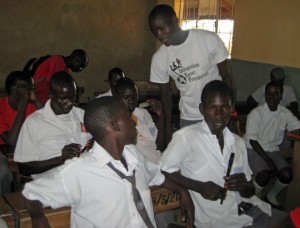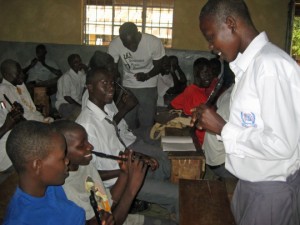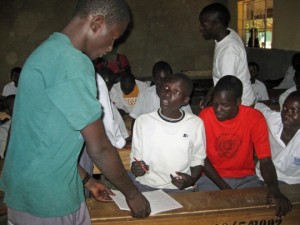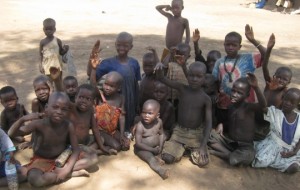
Blog #8 from Burim in Uganda–A Rough Week
Apr 17, 2011

Pabo Camp Girl on Pennywhistle, March 2011
Last week it was hard living in Gulu. The electricity was off for most of the week. It stayed off 5 days straight, came back for 10 hours, and then went off again for almost 24 hours. Since then we have not had any electricity from 6am until 11pm.
But at least we have electricity at night so I can charge my laptop, phones and sleep with the fan on.

Magada Helping with Pennywhistle Class, Gulu Central High School, Ap 2011
During the 5 days of no electricity at all, it was hard to find a good place to eat and not get sick, and I was very careful about that, but in the end I got a stomach problem anyway. It could be from the stress of getting sick and worrying a lot about food, though. I am now doing ok, and classes have been going on as usual.
The only classes I didn’t teach last week were the Primary Schools (K-8). The Primary Schools were off the whole week because they were at athletic competitions. I went and saw some of the competitions.
I still got to teach at Gulu Central High School and gave more pennywhistles to more students, and classes are going very well in this school. I went there on Tuesday and Thursday and both days I was there for 90 minutes of teaching. We have 50 students and all are practicing and working so hard in the music class.

Youth Volunteers Irene (front) and Magada Helping Teach Pennywhistle Class, Gulu Central High School, April 2011
Soon Gulu Central will be starting their final exams for this term and I will not be able to do much with them, so they are working very hard to benefit more, and even during the exams they all promised that will still attend the music classes. I am having so much fun teaching in this school. The students are so committed to the program and are loving their pennywhistles. Our classes are the first time they have ever been able to attend music lessons and learn to play an instrument.

Youth Volunteers Isaac (front) and Magada Helping Teach Pennywhistle Class at Gulu Central, April 2011
Many of these Gulu Central students have already asked me what they need to do to register as a Youth Volunteer and be able to do more and be like the three Youth Volunteers I have helping in this school. All the students think that these volunteers are now the coolest people they know, and they all want to be like them. So I told them that if they stay with the program and do good, then I will make them a volunteer soon.

Pabo Street Kids Singing Class, April, 2011
I also got to go to the Pabo IDP Camp and meet with the street kids. Cambel was in Gulu with his daughter who was admitted to the hospital here, and the older Pabo kids were gone for the athletic competition. But I went to the camp anyway and met with mostly younger children who do not speak English. We did some singing together, first songs that they know already and then I taught them new songs. They all had fun and laughed at me singing in the Acholi language or trying to teach them a song in Acholi. After the singing we went outside and played games together till we were all tired and ready to go home. The kids were talking to me after that but I had no idea what they were saying. They all tried to explain what they were saying to me but it didn’t work, and then as we were walking I saw the driver waiting for me to take me back to Gulu, so I asked him to translate for me, and he said that they were asking me 2 things
1. Teach us to speak English
2. Are we going to play more games next time?

Pabo Street Kids, April 2011
So I told them YES we will be playing more games for sure and I told them that the teacher in the school will probably do a better job of teaching them English and since they are young they can go to school, they said OK and smiled back at me.
I feel very bad for not having a better answer for them and I thought about that a lot,
but even now as I am writing this blog, I still don’t have a better answer to them, and I still think that they need to go to school and learn not only English but so much more.
I asked a social worker why they are not in school and was told that because the war lasted so long many people lost interest in school. And most of these children live with their grandmothers because their mothers (who were very young when they became mothers) have moved to town where they can try to find work and get married.